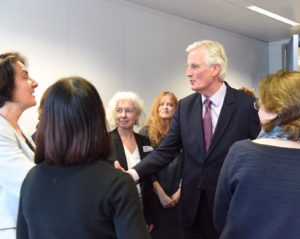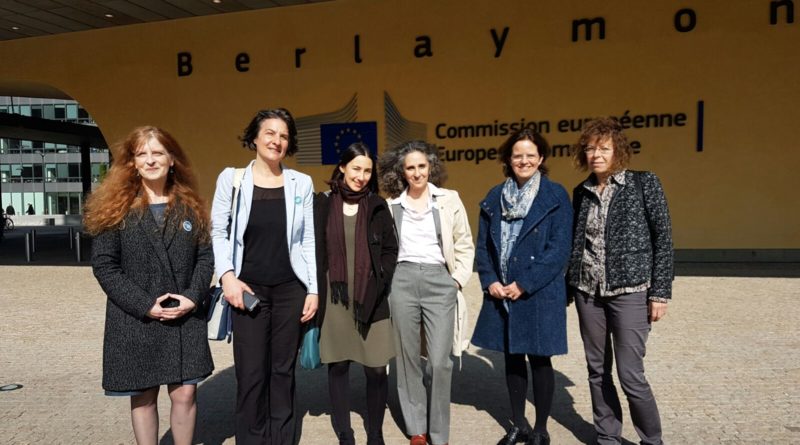Expat groups in Brussels to say #citizensfirst in Brexit negotiations
 The day before the UK notifies the European Union of its intention to leave the bloc, groups of EU expatriates went to Brussels to say that settling citizens rights should be the first item in the Brexit agenda. Michel Barnier, chief negotiator at the European Commission, today met delegations of EU nationals resident in the UK and British living in other EU countries. These groups represent more than 4 million people.
The day before the UK notifies the European Union of its intention to leave the bloc, groups of EU expatriates went to Brussels to say that settling citizens rights should be the first item in the Brexit agenda. Michel Barnier, chief negotiator at the European Commission, today met delegations of EU nationals resident in the UK and British living in other EU countries. These groups represent more than 4 million people.
The rights of EU expatriates and those of their families depend on EU treaties and may no longer apply to such groups once the UK leaves, unless another agreement is put in place. Citizens organisations asked that this is dealt with as a priority and separately from negotiations on trade, finance and all other matters discussed as part of Brexit.
At the meeting, Barnier confirmed what he said in a speech last week. “Brexit made EU citizens worry about their future in EU27 and UK. EU will be firm on their rights,” he tweeted.
His aim is an early agreement in principle, with details finalized in 2018. “The issues at play are complex, whether they are residency rights, access to the labour market, pension or social security rights, or access to education. We will work methodically on each of these points. We will not leave any detail untouched, and we are already working with all Member States on this. It will take time, several months certainly. We must do serious legal work on this with the United Kingdom,” he said.
The British Prime Minister also mentioned in several occasions that citizens rights should be settled early in the negotiations.
What they call for
Campaigners say all existing rights should be preserved, from residence to the right to work, access education, set up business, benefit of welfare, transfer pensions, having qualifications recognised and more. These rights, they argue, should be “indivisible” to ensure full inclusion and participation in society. A solution could be achieved through a deal adopted in spring. “Without a decoupled agreement, people will be left further in limbo for two years or more while the negotiations between the UK and the EU27 progress. Should the negotiations break down irrevocably, the position of expatriates will be unclear,” they explained in a briefing paper.
Campaigners also hope the EU will work with the British government to address the difficulties experienced by EU nationals when getting permanent residence. This is acquired by EU citizens after 5 years’ continuous living in another EU country.
“Problems stem from the fact that the UK, unlike many other EU countries, has historically chosen not to register EU nationals. This has resulted in the current situation, made worse by the recent hardening of the Home Office’s position,” continues the paper. “The UK, uniquely, insists on far more requirements than any other EU country, all of which have a much simpler, less costly and more straightforward registration process.”
At the same time, campaigning groups call on the EU to work with the other 27 countries to resolve specific problems emerged since the EU referendum. This concerns, for example, EU citizens returning to an EU country post-Brexit with British family members and partners. Another problem is about countries that do not allow dual nationality, when this is pursued as a way to secure full citizenship rights.
There are also complex cases of children, the elderly, the most vulnerable and people with disabilities, who may not qualify for permanent residence but do not have other places to go.
At the meeting there were representatives of British in Europe, a coalition of 11 groups representing Britons living in other EU countries. “Part of the problem is that there are not enough data on where people are registered and what is their present situation,” said Daniel Tetlow. “There is the misconception that the majority of Brits in other EU countries are pensioners, but they are less than a third. Most people work, contribute to their societies and face a variety of other situations.”
Members of a working group set up at the European parliament to monitor citizens rights recently wrote to UK Minister of State for Immigration, Robert Goodwill, reminding that EU laws will continue to apply during the Brexit negotiations.
End the uncertainty for EU and UK citizens. Cross-party MEP letter to Robert Goodwill MP #citizensfirst pic.twitter.com/28hajBfIi0
— Catherine Bearder (@catherinemep) March 27, 2017
The Mayor of London, Sadiq Khan, also in Brussels today for meetings with EU leaders, added his voice in calling to guarantee rights of EU nationals in the UK. One of the estimated 3.3 million EU citizens in Britain are based in London.
Claudia Delpero © all rights reserved.
Photo top page: Anne-Laure Donskoy, Gudrun Parasie, Silvia Gonzalez, Monique Hawkins, Costanza de Toma and Germana Canzi of the3million outside the Commission in Brusselss; courtesy the3million. Photo in text: meeting with Michel Barnier, © European Commission.




